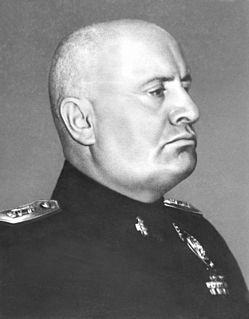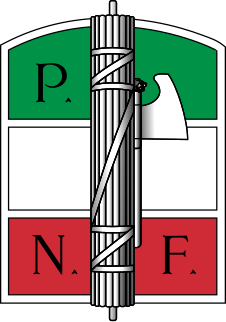
Alessandro Pavolini was an Italian politician, journalist, and essayist, notable for his involvement in the Fascist government, during World War II, and also, for his cruelty against the opponents of fascism.

Carlo Alberto Biggini was an Italian fascist politician who served as Minister of Education before and after proclamation of the Italian Social Republic under Benito Mussolini.

The March on Rome was an organized mass demonstration in October 1922, which resulted in Benito Mussolini's National Fascist Party ascending to power in the Kingdom of Italy. In late October 1922, Fascist Party leaders planned an insurrection, to take place on 28 October. When fascist troops entered Rome, Prime Minister Luigi Facta wished to declare a state of siege, but this was overruled by King Victor Emmanuel III. On the following day, 29 October 1922, the King appointed Mussolini as Prime Minister, thereby transferring political power to the fascists without armed conflict.

Michele Bianchi was an Italian revolutionary syndicalist leader who took a position in the Unione Italiana del Lavoro (UIL) He was among the founding members of the Fascist movement. He was widely seen as the dominant leader of the leftist, syndicalist wing of the National Fascist Party. He took an active role in the "interventionist left" where he "espoused an alliance between nationalism and syndicalism." He was one of the most influential politicians of the regime before his succumbing to tuberculosis in 1930. He as well was one of the grand architects behind the "Great List" which secured the parliamentary majority in favor of the fascists.

Roberto Farinacci was a leading Italian Fascist politician, and important member of the National Fascist Party (PNF) before and during World War II, and one of its ardent anti-Semitic proponents; Christopher Hibbert describes him as "slavishly pro-German".

Giacomo Acerbo, Baron of Aterno was an Italian economist and Fascist politician who drafted the Acerbo Law which solidified Benito Mussolini's position once in power.
Amerigo Dumini was an American-born Italian fascist hitman who led the group responsible for the 1924 assassination of Unitary Socialist Party leader Giacomo Matteotti.

Giovanni Marinelli was an Italian Fascist political leader.

Italian Fascism, also known as Classical Fascism or simply Fascism, is the original fascist ideology as developed in Italy. The ideology is associated with a series of three political parties led by Benito Mussolini, namely the Fascist Revolutionary Party (PFR) founded in 1915, the succeeding National Fascist Party (PNF) which was renamed at the Third Fascist Congress on 7–10 November 1921 and ruled the Kingdom of Italy from 1922 until 1943 and the Republican Fascist Party that ruled the Italian Social Republic from 1943 to 1945. Italian Fascism is also associated with the post-war Italian Social Movement and subsequent Italian neo-fascist movements.

General elections were held in Italy on 6 April 1924. They were held under the Acerbo Law, which stated that the party with the largest share of the votes would automatically receive two-thirds of the seats in Parliament as long as they received over 25% of the vote. The National List of Benito Mussolini used intimidation tactics, resulting in a landslide victory and a subsequent two-thirds majority. This was the last multi-party election in Italy until 1946.

The Kingdom of Italy was a state which existed from 1861—when King Victor Emmanuel II of Sardinia was proclaimed King of Italy—until 1946—when civil discontent led a constitutional referendum to abandon the monarchy and form the modern Italian Republic. The state was founded as a result of the unification of Italy under the influence of the Kingdom of Sardinia, which can be considered its legal predecessor state.

Chamber of Fasci and Corporations was the lower house of the legislature of the Kingdom of Italy from March 23, 1939 to August 2, 1943, during the height of the regime of Benito Mussolini's National Fascist Party.

General elections were held in Italy on 26 March 1934. At the time, the country was a single-party state with the National Fascist Party (PNF) as the only legally permitted party.
Cesare Rossi was an Italian fascist leader who later became estranged from the regime.
Events from the year 1922 in Italy.

The Italian Parliament (1928–1939) was the parliament of Italy as it existed following the constitutional reforms enacted after the Italian general election, 1924. It was, in turn, substantially restructured in 1939. This early Fascist-era legislature was a continuation of the bicameral parliament that had existed prior to 1928, though the character, structure and responsibilities of each house were altered to various degrees.



















